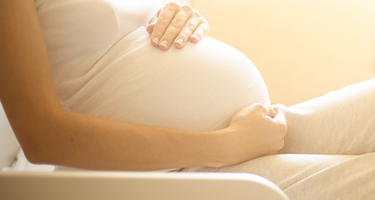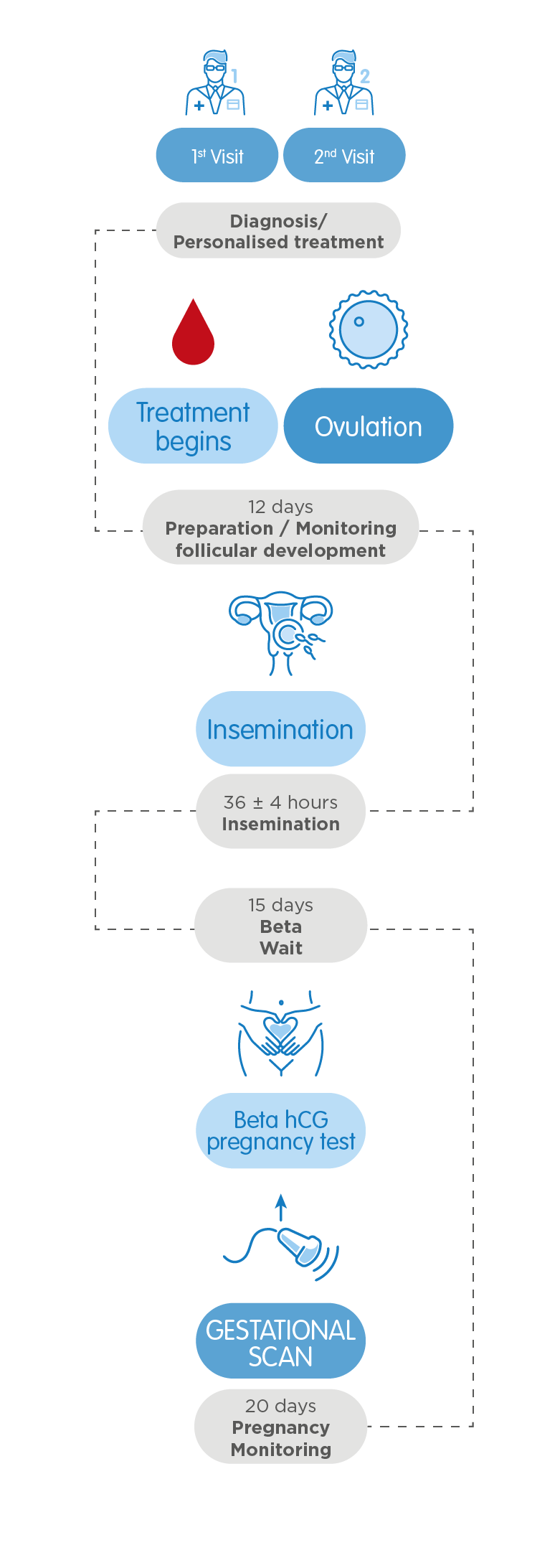

Artificial Insemination (AI) consists of depositing a semen sample, which has been prepared in advance in the laboratory,
Artificial Insemination (AI) is a less complex and less invasive assisted reproduction treatment. It is a form of artificial insemination in which a semen sample, either from a male partner or from a donor, is inserted directly in the woman’s uterus. This procedure increases the chances of pregnancy compared to sexual intercourse for several reasons:
Artificial Insemination can be performed with a semen sample from a male partner or from a donor (donor insemination).It is often recommended in less complex cases where there may not necessarily be any fertility issue, such as for single women requiring donated sperm or female same-sex couples. However, AI can also be used to treat specific problems. Some of these include:
Single woman
Heterosexual couples
Female same-sex couples
As a low complexity treatment, Artificial insemination offers lower pregnancy rates than other assisted reproduction treatments, but higher than those of sexual intercourse.
*Pregnancy rate after three attempts
|
|


The treatment process starts at the beginning of the woman’s menstrual cycle, at which point ovarian stimulation begins. This lasts between 10 – 12 days.
Ovarian stimulation is optional; however, it can increase the chances of success. As women naturally produce only one egg per menstrual cycle, ovarian stimulation ensures one or two eggs develop. Your consultant will help you decide whether ovarian stimulation is recommended in your specific circumstances.

The ovulation cycle is carefully monitored using a series of ultrasound scans and blood tests. Once the follicles have reached the appropriate number and size, a hCG hormone trigger injection may be administered to induce ovulation. The insemination procedure is scheduled 36 hours later.

On the day of the insemination procedure, the sperm sample is prepared in the laboratory of your IVI clinic. If the male partner’s sperm is being used, the partner must deposit the sample to the clinic two hours before the procedure is scheduled to take place. This process allows our scientists to select and concentrate the spermatozoa with the best motility and remove immobile or slow-moving spermatozoa, optimising the quality of the sample and increasing the chances of fertilisation.
The insemination procedure is quick and painless. It is performed without sedation or any need for surgery. After inserting a speculum, the semen sample is introduced through a cannula into the uterus. Following the procedure, you will rest for a few minutes. Afterwards, your consultant will arrange with you the date of your blood pregnancy test, which is usually 14 - 15 days after the IUI procedure. At IVI, we recommend that you live life as you normally would during this waiting period, however you should avoid high-intensity or overly strenuous activities.
If the result of your blood pregnancy test is positive, a follow-up ultrasound scan is scheduled 20 days later to confirm the pregnancy. Once the pregnancy is confirmed and you have been discharged from your IVI clinic, you can begin your maternity care with your chosen provider.

You can also call us on +34 960 451 185
Males with non-optimal or diminished sperm quality.
Artificial insemination is a technique that is indicated for an infertile couple when the following requirements are met:
With the start of the treatment, which is established by the woman’s menstrual cycle, the ovarian stimulation begins, and it lasts for approximately 10 days. Once the follicle reaches the right size, ovulation is induced and insemination is scheduled 36 hours later. In total, the whole process would take about 12 days.
Insemination is a procedure that is carried out as an outpatient at the clinic and does not involve entering the operating theatre. Once the insemination has been performed, and although it does not increase the chances of success, the woman can rest for 15-20 minutes for greater comfort and peace of mind. Once they leave the clinic, they can go about their normal life.
Artificial insemination is a simple and painless process, which does not require the sedation of the patient. It is carried out as an outpatient at the clinic by inserting a fine catheter that barely causes any discomfort to the patient.
The cost of Artificial Insemination treatment at IVI Spain is €840.
Artificial Insemination treatment can be performed at any IVI clinic in Spain.
Contact your nearest IVI clinic and ask for information without obligation.


We have more than 30 clinics in Spain with the best specialists and state-of-the-art technology to help you make your dream of becoming a mother come true.
Contact your nearest IVI clinic and ask for information without obligation.